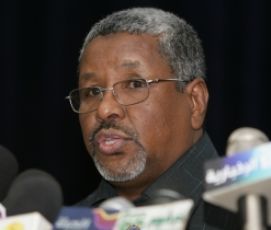Sudan moving towards a “civil state with Islamic background” – official
April 6, 2011 (KHARTOUM) – Sudan is willing to look beyond Islamic Shari’ah laws and consider other schools of thoughts, “including Marxism”, in order to reach a consensus on “a civil state with Islamic background” in the north after south Sudan seceded, an official said on Thursday.

As foreseen, the south voted almost unanimously to secede from the predominantly Muslim north in a referendum conducted in January under the 2005’s peace deal that ended nearly half a century of intermittent north-south civil wars.
Abdul Rahman al-Khidir, chairman of the ruling National Congress Party (NCP) in the capital Khartoum, said in a seminar with media experts on Thursday that Islamic shari’ah laws are “the primary foundation” of the country’s constitution.
However, the NCP official added that this “does not prevent consideration and recognition of other human experiences, including Marxism,” as quoted by Sudan’s official news agency SUNA.
Al-Khidir further urged all Sudanese to rise above political affiliations and overcome disagreements and discord to agree on a constitution that enjoys total consensus and respect by all sides.
“There is a semi-consensus that the next state in north Sudan would be a civil state with Islamic background,” he said.
Mainstream north Sudanese politicians, including the National Umma Party leader Al-Sadiq Al-Mahdi, tend to use the term “civil state” and avoid any mention of the term “secular state” for fears of its negative connotation in the common mentality of north Sudan’s conservative Muslim society.
The sensitivity of Shari’ah law issue was best manifested in last month’s case of Hassab Allah Omar, a senior Sudanese intelligence official who was embroiled in a nationwide controversy when he suggested in a radio interview that Islamic laws could be repealed in north Sudan if political parties agreed to it.
Hassab Allah Omar was eventually sacked from his position under pressure from religious circles.
Sudan’s ruling NCP, which originally stemmed from the Muslim Brotherhood group, seized power in a military coup in 1989 and has since maintained that it applies Shari’ah laws though certain Shari3ah punishments were seldom carried out. The application of Shari’ah is often cited as one of the reason that led to the breakup of the country.
(ST)
